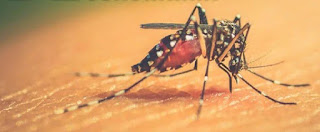 Dengue is a viral infection that spreads from mosquitoes to people. It is more common in tropical and subtropical climates. Most people who get dengue won’t have symptoms. But for those that do, the most common symptoms are high fever, headache, body aches, nausea and rash. Most people will get better in 1–2 weeks, however, some people develop severe dengue which includes shock or respiratory distress due to plasma leakage, severe bleeding, organ impairment, and death.
Dengue is a viral infection that spreads from mosquitoes to people. It is more common in tropical and subtropical climates. Most people who get dengue won’t have symptoms. But for those that do, the most common symptoms are high fever, headache, body aches, nausea and rash. Most people will get better in 1–2 weeks, however, some people develop severe dengue which includes shock or respiratory distress due to plasma leakage, severe bleeding, organ impairment, and death.Dengue has been reported in 28 of 32 Mexico states in 2023. Quintana Roo (Cancun) is the leading state reporting Dengue cases in 2023. In 2022, the PAHO reported 36,926 cases throughout Mexico and 53 dengue deaths (Sonora confirmed 14 deaths, Oaxaca 13 deaths). In addition, dengue transmission has been documented in Yucatan, Mexico (Cancun) since 1979. The recent increase in dengue cases in Mexico has been partly attributed to the genetic diversification of DENV serotypes and the emergence of new genotypes across Latin America.
Dengue fever is considered a year-round, nationwide threat in Mexico; however, risk is highest June-October. Health authorities identified roughly 59,918 cases of dengue fever in 2022, 36,742 cases in 2021, 120,639 cases in 2020, and 268,458 cases in 2019.Health authorities have reported elevated dengue fever activity nationwide with more than 9,390 confirmed cases (59,037 probable cases) reported from Jan. 1-Aug. 14. This is more than 3.3 times higher than the 2,886 cases reported over a similar period in 2022.
Health officials urge anyone experiencing dengue fever symptoms to seek immediate medical treatment.
According to WHO report from 29. July 2023 is there since the beginning of 2023, dengue outbreaks of significant magnitude have been recorded in the WHO Region of the Americas, with close to three million suspected and confirmed cases of dengue reported so far this year, surpassing the 2.8 million cases of dengue registered for the entire year of 2022. Of the total number of dengue cases reported until 1 July 2023 (2 997 097 cases), 45% were laboratory confirmed, and 0.13% were classified as severe dengue.
WHO has assessed the risk of dengue as high at the regional level due to the wide spread distribution of the Aedes spp. mosquitoes (especially Aedes aegypti), the continued risk of severe disease and death, and the expansion out of historical areas of transmission.
According to the Mexico IHR National Focal Point, up to EW 26 of 2023, of the 31 549 reported dengue cases, 4400 (14%) were laboratory confirmed, and 141 (2%) were classified as severe dengue. The cases registered up to EW 26 of 2023 are 2.5 times higher compared to the same period in 2022 and 58% higher compared to the average of the last five years. In the same period, five deaths were reported with CFR of 0.02%.


